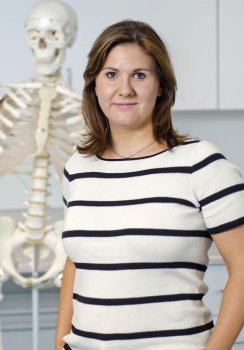
Simple physiotherapy exercises could be the most effective treatment for shoulder pain according to University of Ulster research.A new study combining the results of previous clinical trials worldwide has revealed that exercise reduces pain, improves muscle strength and enhances overall quality of life.
Catherine Hanratty, a PhD student from the University’s Health and Rehabilitation Sciences Research Centre, said:
“Shoulder pain is the third most common musculoskeletal problem seen by GPs with approximately 3 in 10 people experiencing shoulder problems at any one time. Treatment is estimated to cost the health service £100 million per year.
“The majority of people with shoulder pain are diagnosed with subacromial impingement syndrome (SAIS), which is often caused by sustained overuse, overhead work or poor posture. Genetic factors may also play a role. It affects people from all walks of life from elite athletes to tradesmen and office workers. It is also a major problem faced by patients with rheumatological conditions.”
Catherine’s research, which has just been published in a leading journal entitled ‘Seminars in Arthritis and Rheumatism’, is the first study to combine the results of previous clinical trials carried out in the area of exercise and shoulder impingement from around the world.“Analysis of the results and effectiveness of exercise across all available clinical trials demonstrates that physiotherapy exercises are effective at reducing pain and improving muscle strength, function and general well-being for patients. Unsurprisingly, the longer patients performed the exercises, the greater the reduction in their pain.
“Doctors often refer patients with shoulder impingement for physiotherapy treatment, yet despite its widespread use, clinicians and researchers have been unsure how effective exercises actually are. For the first time this study provides definitive answers.”Catherine has now begun a new randomised controlled trial exploring exercise management of shoulder pain. This work is being undertaken in collaboration with physiotherapists in the Northern and Belfast Health and Social Care Trusts and an international team of researchers from the University of Ulster, Keele University and the Mayo Clinic based in the United States.
She said:
“I hope that the results of this study combined with the new clinical trial will help physiotherapists and doctors improve the outcomes for people with shoulder pain.
”Dr Joseph McVeigh, one of Catherine’s PhD supervisors from the Health and Rehabilitation Sciences Research Centre at Ulster, added:
“This study represents a major step forward for the evidenced based management of shoulder pain; for the first time clinicians can say with confidence that physiotherapy exercises work for shoulder impingement syndrome. We are looking forward to the results of our randomised controlled trial and are hopeful that we can further demonstrate the effectiveness of physiotherapy management of this very debilitating condition.”

















